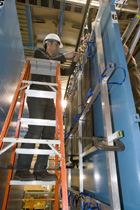Second to none, but made from second-hand parts
 |
| SciBooNE collaborator Yasuhiro Nakajima, a graduate student from Kyoto University, installs counters made up of reused scintillators, photo tubes and bases onto 2-inch recycled steel plates. Other than the support frame, everything in the photo is recycled. |
One of Joe Walding's fond memories of working on SciBooNE takes place amid piles of rubbish. Walding and other graduate students dug through abandoned materials, collecting electronic cables from previous experiments and sorting through 30-year old photomultiplier tubes. "We were very close to not having enough tubes for the detector," Walding recalled. "So every good one found brought a sense of excitement and relief."
Those photomultiplier tubes are essential for SciBooNE's measurements of cross sections of neutrino interactions. A new tube can cost several hundred dollars. However, scrounging collaborators and a resourceful international collaboration, put SciBooNE together on a shoestring budget.
SciBooNE's detector systems are made almost entirely of reused materials, including components from Japan, Italy and from Fermilab projects. SciBooNE's muon range detector has 360 channels of scintillators, photomultiplier tubes and bases, all collected or borrowed.
Reusing materials for SciBooNE has saved limited resources and millions of dollars. SciBooNE project head Rick Tesarek estimates that it would cost $4.5 million to create the components of the experiment. Instead, the project cost $1.2 million.
|
| Listen to a Fermilab Today interview with SciBooNE project head Rick Tesarek. |
Tesarek estimates that they saved $120,000 on photomultiplier tubes alone thanks to the help of graduate students like Walding, a student from Imperial College, London. Tesarek called friends and colleagues to ask for old tools, equipment racks, cable trays, cables and electronics. In an international recycling effort, the project's collaborators disassembled, shipped and reassembled a detector from KEK in Japan. "The SciBar detector represents 15 tons of scintillator that we were able to reuse," said Tesarek.
Now, Tesarek and his colleagues are thinking about ways to reuse materials when SciBooNE ends. "Some components will go back to Europe and Japan, but we will likely reuse the scintillator and steel here at Fermilab," said Tesarek. Fermilab's tradition of saving parts and money will continue.
-- Haley Bridger
|